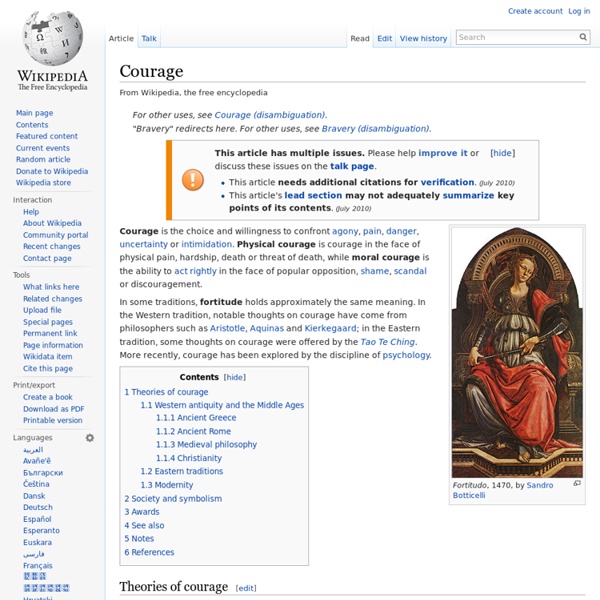Courage

Courage
Un article de Wikipédia, l'encyclopédie libre. Le courage est un trait de caractère qui permet de surmonter la peur pour faire face à un danger. Le terme peut aussi être employé pour exprimer l'endurance, notamment à l'égard de la douleur. Le courage est à distinguer d'autres notions à connotations plus péjoratives, comme l'audace ou la témérité, pour lesquelles le moteur de l'action n'est pas la peur, mais le désir ou l'orgueil. Le courage authentique requiert l'existence de la peur, ainsi que le surpassement de celle-ci dans l'action. Lorsque le danger est confronté sans peur, on parle plutôt d'« assurance » ou, de façon plus péjorative, d'inconscience, notamment lorsque le danger est manifestement sous-estimé. Conception platonicienne du courage[modifier | modifier le code] Conception orientale du courage[modifier | modifier le code] Le courage, s’il n’était pas mis au service de la justice, était à peine digne d'être considéré comme une vertu. Références[modifier | modifier le code]
Wisdom
Ability to think and act using knowledge, experience, understanding, common sense and insight Wisdom, sapience, or sagacity is the ability to contemplate and act productively using knowledge, experience, understanding, common sense, and insight.[1] Wisdom is associated with attributes such as unbiased judgment, compassion, experiential self-knowledge, self-transcendence, and non-attachment,[2] and virtues such as ethics and benevolence.[3][4] Wisdom has been defined in many different ways,[2][5][3] and there are several distinct approaches to assessing the characteristics attributed to wisdom.[6][7] Definitions[edit] The Oxford English Dictionary defines wisdom as "Capacity of judging rightly in matters relating to life and conduct; soundness of judgment in the choice of means and ends; sometimes, less strictly, sound sense, esp. in practical affairs: opp. to folly;" also "Knowledge (esp. of a high or abstruse kind); enlightenment, learning, erudition Mythological perspectives[edit]
Related:
Related:



